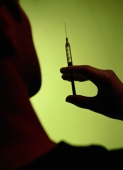- Could Your Grocery Store Meat Be Causing Recurring UTIs?
- Are You Making This Expensive Thermostat Error This Winter?
- Recognizing the Signs of Hypothyroidism
- 10 Strategies to Overcome Insomnia
- Could Artificial Sweeteners Be Aging the Brain Faster?
- Techniques for Soothing Your Nervous System
- Does the Water in Your House Smell Funny? Here’s Why
- Can a Daily Dose of Apple Cider Vinegar Actually Aid Weight Loss?
- 6 Health Beverages That Can Actually Spike Your Blood Sugar
- Treatment Options for Social Anxiety Disorder
Experimental Cervical Cancer Vaccine Looks Promising in Trial


An experimental vaccine meant to protect against nine types of human papillomavirus (HPV) could prevent 90 percent of all cervical cancers, a new study suggests.
Researchers examined data from more than 2,500 women with precancerous cervical lesions and found that nearly all were caused by the nine types of HPV targeted by the vaccine being developed by Merck and Co.
The new vaccine, currently undergoing clinical trials, protects against more types of HPV than current vaccines, according to the study published Oct. 1 in the journal Cancer Epidemiology, Biomarkers & Prevention.
“We wanted to study how many cervical precancers could potentially be prevented by an investigational nine-valent HPV vaccine that provides protection against the HPV types 6, 11, 16, 18, 31, 33, 45, 52 and 58,” Dr. Elmar Joura, an associate professor of gynecology at the Medical University of Vienna in Austria, said in a journal news release.
“Given the high vaccine efficacy that was observed in a large phase III clinical trial testing the nine-valent HPV vaccine, if vaccination programs with this new-generation vaccine are effectively implemented, approximately 90 percent of invasive cervical cancer cases worldwide could be prevented, in addition to the majority of precancerous lesions,” he said.
Of the women aged 15 to 26 with precancers, about one-third were infected with more than one HPV type, the researchers said. Of women aged 24 to 45 with precancers, nearly one in five was infected with more than one HPV type, the investigators found.
HPV, which is spread through sexual contact, not only can lead to cervical cancer, but also cancers of the vulva, vagina and anus in women. In men, it can lead to cancers of the anus and penis.
The study was funded by Merck. Joura has received grant support to his institution, as well as advisory board and lecture fees from Merck and other drug companies.
Joura noted that even though current HPV vaccines (Gardasil and Cervarix) are known to be safe, their use in the United States and other wealthy nations has been “inadequate.” He said the use of HPV vaccines must increase if their full potential to reduce cervical cancer is to be achieved.
More information
The U.S. National Cancer Institute has more about HPV vaccines.
Source: HealthDay
Copyright © 2026 HealthDay. All rights reserved.










